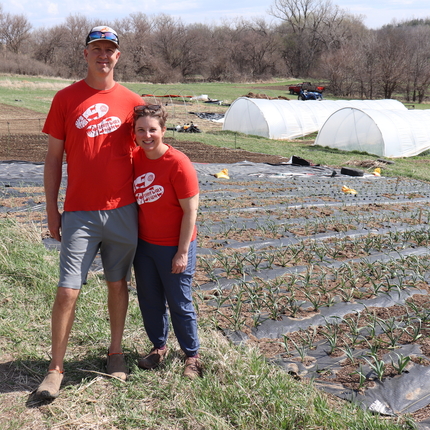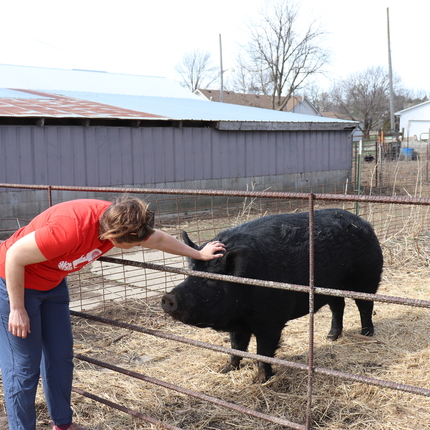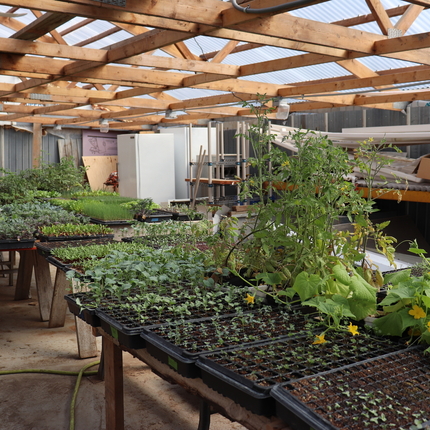Click here to check out the case study.
Angelyn Wang contributed to this story.
Even though Iowa’s climate only allows for a limited growing season, Tiffiny Clifton and Matt Johnson are confident they can sell locally grown food year round.
Tiffiny and Matt own and operate Long Walk Farm, in Council Bluffs, Iowa. They started their farm in July 2020, as a diverse, sustainable, and regenerative operation. The farm is transitional with the intention to be organic certified next spring.
“In the midst of the COVID-19 pandemic, we decided to buy a farm,” said Matt. “It was something that had been in the back of my and Tiffany’s minds for a while.”
Tiffiny grew up in a farming area and did chores for her neighbors. Matt’s grandparents farmed, and he would have gone into agriculture if his family had owned land.
After reading a variety of books, researching online, and studying large and small farms around the country, Matt and Tiffiny were ready. They chose to grow vegetables versus row crops because they have a lower barrier of entry and are less expensive.
“We tried to pick up the best tools and best tips to do things in different climates and then tried to adapt them here to our climate,” Tiffiny said.
They wanted to treat their land with respect and care for it like the previous owners, who lived there for 50 years, and like the previous owners’ grandparents, who called the land home for 50 years before that.
“Our neighbors love us so far, though they thought we were goofy in the beginning, and asked about all the lights in our greenhouses,” said Matt.
The greenhouses are part of the extensive infrastructure they put up so they can grow year round.
“It's almost as difficult to grow in the heat of the summer as it is in the middle of winter,” said Tiffiny. “We still have day jobs because this is still something that is being built. We don’t have a big answer to this, we love this place, but if we had flat ground, it would make life easier. But we love the fertile soil.”
The general public and folks who are interested in organic practices and eating locally have been excited, welcoming, and very inquisitive, said Matt and Tiffiny, who do business with restaurants known to buy local. The chefs are glad to have options for fresh produce.
Matt and Tiffiny consider themselves lucky they haven’t encountered any big roadblocks while building up their business. They’re preparing to build a commercial kitchen to process such value-added products as refrigerator pickled produce, Mason jar salads, spiralized vegetables, and more.
“We want to sell to individuals who care about where their food comes from, individuals who want to buy local, and individuals who want ready-to-eat foods that don’t require time to prepare,” Tiffiny said.
Their goods can also be purchased online and from their honor shop roadside stand at 23780 Dogwood Road, Council Bluffs, Iowa.
“We had an honor stand with folks coming out to our farm, grabbing stuff, and being very generous,” said Matt. “It was pay what you want, whatever you think it's worth. We are in the process of redesigning the honor shop and will be launching a local line site to allow for pre-ordering for farmers market pickup and pick up at the farm.”
They also sell at local farmers markets and larger markets including Legacy Farmers Market in west Omaha on Saturdays and Aksarben Omaha Farmers Market on Sundays.
“Over the last two years at the farmers market we’ve seen a lot of younger shoppers,” said Matt. “The average age has dropped. The younger 20- and 30-year-olds have gotten more of the idea of local, fresh, and real.”
Matt and Tiffiny are hoping to reach even more people and show them how accessible local foods can be.
“In my opinion, education and money go hand in hand,” said Matt. “People frequently don’t know there is local food available. Prior to this year, it was a preconceived idea that buying local was more expensive. Now that is not usually the case.”
To move things forward in the local foods sphere, they plan to continue their year-round availability, along with food pop-ups at restaurants and other frequently visited places. They also work on education projects May through October, and they hope they can eventually help make local foods a more stable option for people throughout the year.
“We need a lot more grassroots education,” said Tiffiny. “You teach the kids, and the kids teach everybody else. There has to be consistent and easy access to local food year round. I wish everyone believed local food was accessible to them and available without a hassle. Everyone should be able to, and know they can, eat local all the time.”
This case study series highlights an innovative local foods access initiative happening in southwest Iowa. It includes a variety of initiatives and projects that can serve as idea-starters to incorporate in other communities. The Center for Rural Affairs is able to assist in developing local food access plans across the region. Click here for more information.






